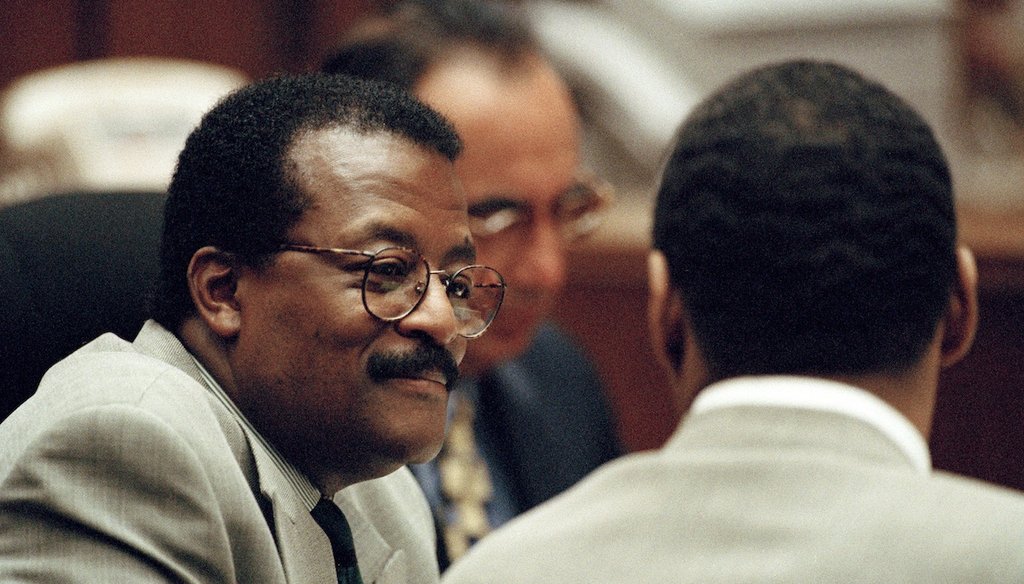



Defense attorney Johnnie Cochran Jr., left, confers with double murder defendant O.J. Simpson July 7, 1995, during a hearing in Los Angeles. (AP)
Although Cochran had been part of a group advocating for reparations for Black Americans, his death was not linked to that fight.
No spin, just facts you can trust. Here's how we do it.
O.J. Simpson, Tupac Shakur and Snoop Dogg are among the high-profile celebrities whom lawyer Johnnie Cochran Jr. defended in court. But Cochran’s legal work to advance slavery reparations before his 2005 death has become fodder for a baseless conspiracy theory.
"Before Johnnie Cochran mysteriously passed away he was sueing (sic) the government for slavery reparations," read the caption on a Feb. 22. Instagram post. Comments on the video suggest a conspiratorial link between his death and the reparations work.
The Instagram post was flagged as part of Meta’s efforts to combat false news and misinformation on its News Feed. (Read more about our partnership with Meta, which owns Facebook and Instagram.)
Cochran's death at home in Los Angeles is hardly a mystery. He was diagnosed with a brain tumor in December 2003 and died from its complications in March 2005 at age 67. In 2007, Cedars-Sinai Medical Center in Los Angeles opened the Johnnie L. Cochran Jr. Brain Tumor Center in memory of Cochran, who had received treatment at the hospital.
Cochran was part of a group formed in 2000 called Reparations Assessment Group, which hoped to pursue reparations from local and national governments and public and private companies that benefited from the enslavement of Black people.
In 2003, the group filed a lawsuit on behalf of the victims and descendants of the 1921 Tulsa Race Massacre, in which a mob of white people killed hundreds of residents in the predominantly Black community of Greenwood, nicknamed America’s Black Wall Street. The lawsuit against the city of Tulsa, its police department and the state of Oklahoma was dismissed by a district federal court and the U.S. Supreme Court declined to hear an appeal.
There is no evidence Cochran’s death from cancer is in any way associated with his work in this area. We rate this claim Pants on Fire!
Instagram post (archived link), Feb. 22, 2024
CBS News, Reparations For Slavery, 2000
Cedars-Sinai Medical Center, In Memory of Famed Attorney Johnnie L. Cochran, Center Will Streamline Brain Tumor Studies, Apr. 23, 2007
Los Angeles Times, Flashy, Deft Lawyer Known Worldwide, Mar. 30, 2005
The Harvard Crimson, HLS Professor, Reparations Group File Suit, Feb. 25, 2003
Los Angeles Times, So long, slavery reparations, Oct. 31, 2008
Oklahoma Supreme Court grants oral argument in Tulsa Race Massacre case, Feb. 21, 2024
The Associated Press, Biden decries ‘horrific’ Tulsa massacre in emotional speech, Jun. 1, 2021
The Oklahoman, Race-riot recourse blocked. Supreme Court refuses appeal after decisions, May 17 2005.
Harvard University, The Tulsa Massacre and the Call for Reparations, accessed Feb. 23, 2024
NPR, Reparations Lawsuit, Mar. 25, 2002
In a world of wild talk and fake news, help us stand up for the facts.
